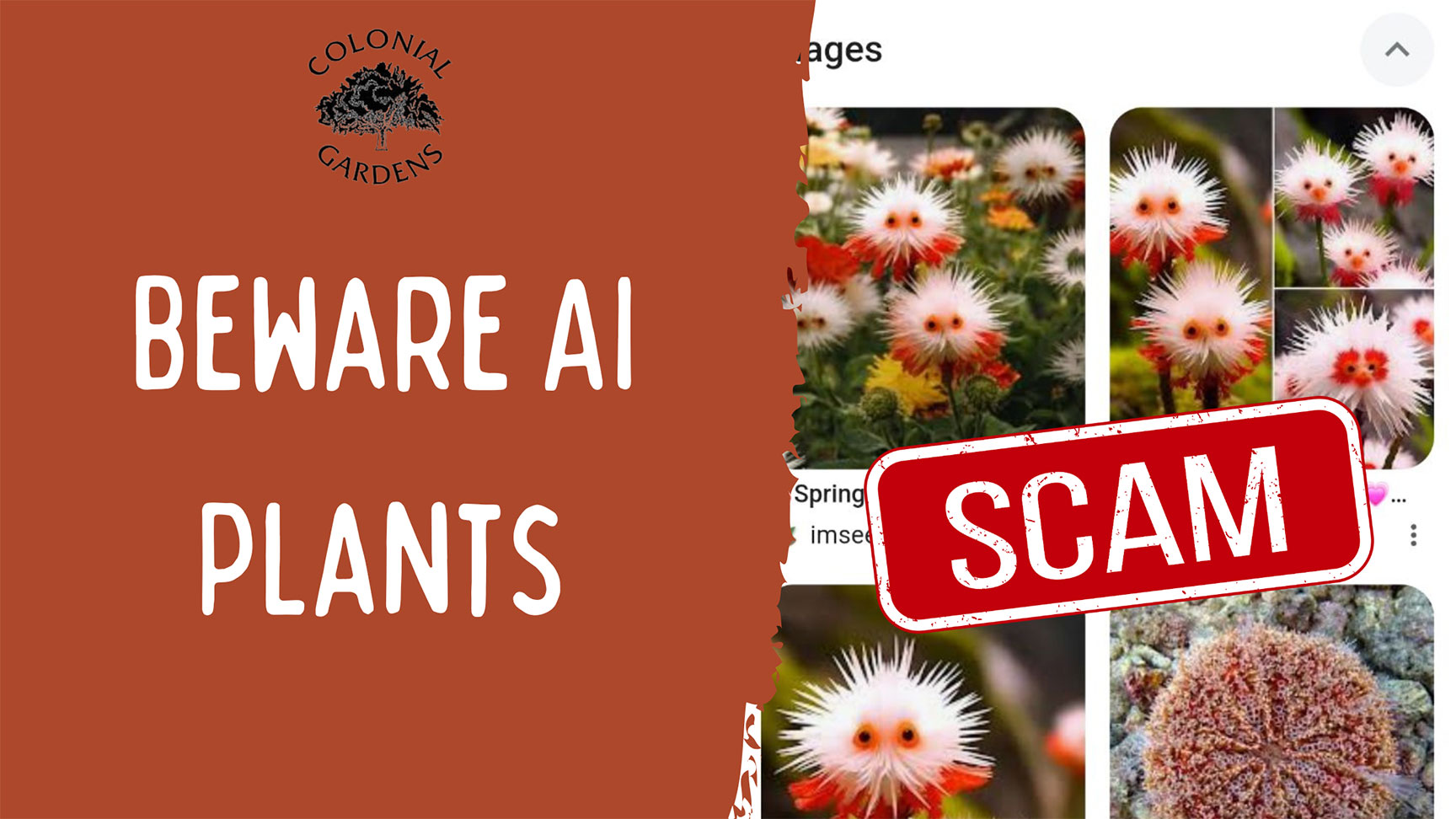
AI manipulated images of plants may seem like harmless fun, but bad actors are using these photos to scam gardeners.
It started with a Black Bleeding Heart.
The phone rang and someone asked for a black bleeding heart (a shade loving perennial in the Dicentra genus). “We have them in pink and white, but I don’t think there is such a thing as a black version.”
“Yes, there is. I’ve seen pictures online.”
New plants are debuted every day so we typed “black bleeding heart” into Google, and sure enough, there was a photo of a black bleeding heart. Looking a little closer, however, there were red flags. There was only one photo of the black bleeding heart across multiple websites. There wasn’t proper growing or varietal information. It was a fake.
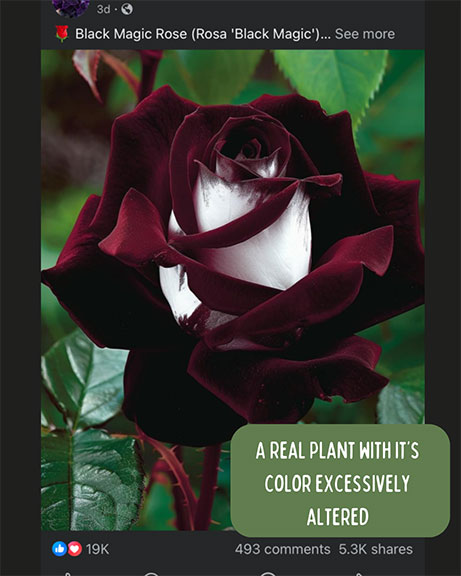
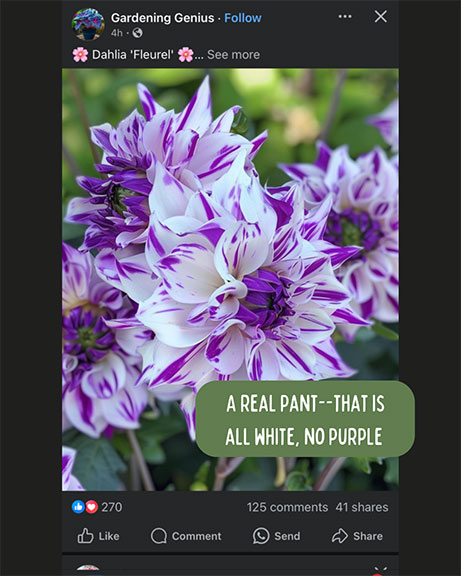
There’s nothing inherently wrong with a photoshopped flower–it’s art–but something more nefarious was going on here. Websites were using that photo to sell “Black Bleeding Heart” seeds. Even on ‘reputable’ marketplaces such as Etsy and Amazon, you could pay to get a packet of seeds to supposedly grow this plant. We informed the customer that this isn’t a plant that exists and that the seeds being sold online were a scam.
In the age of AI, this problem has gotten exponentially worse. This spring was flooded with 100% computer generated flowers that looked like something out of a sci-fi movie. We’ve had dozens of customers call this spring to request plants we’ve never heard of, only for us to find out that they aren’t real. We always inform these customers that these plants–blue hostas, black and purple coleus, Cat’s Eye Dazzle, as examples–are not real and to never buy them from anyone claiming to sell them.
It seems like some of the scammers are learning from their mistakes as the AI flowers are becoming more subtle. The caption will present some factual information about a real plant. The picture will be a ridiculous manipulation of that plant, whether in color, size, or shape. Sometimes the plant is paired with a picture of real people, which both reinforces the scale of this giant fake purple elephant ear or “petunia tree” and makes it look more authentic. If you don’t know that you’re looking at an AI photo, it’s easy to assume that this is simply an educational post about a unique type of plant. However, when you look through the comments, you’ll find links on how to “buy” that plant.
The question isn’t “why do people believe in these things?” Why SHOULDN’T our customers believe in some of these plants? After all, GMO purple tomatoes and glow-in-the-dark petunias are real plants! Nature is full of nearly unbelievable beauty in many forms and humans have bred some incredible traits into our plants.
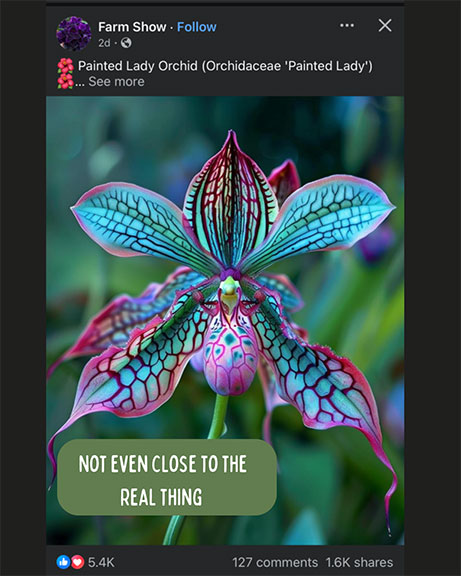
Unfortunately, bad actors are taking advantage of our sense of wonder and our craving for unique and beautiful things. These scams are dangerous. Some of our customers have lost money to these scams, receiving seeds that don’t germinate or even sawdust in the mail. There are many worse outcomes though–the seeds you plant could be an invasive species in our area or you could put your payment information into a scam website that can hack your card or steal your personal information.
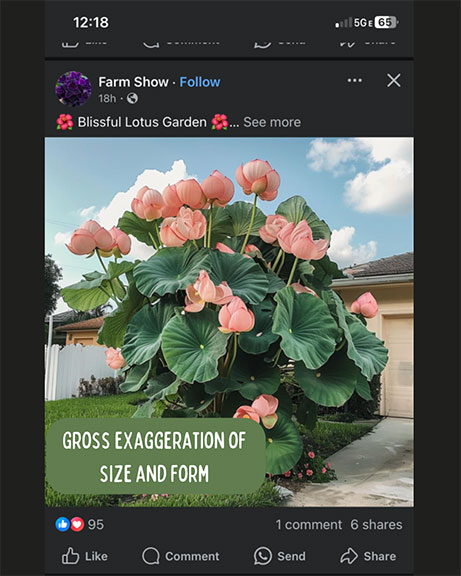
The internet is a place where we can educate our audience and connect people with fantastic plants, but it is also a place where misinformation can flourish and scammers can prey upon unsuspecting people. For plants, this is just another reason that independent garden centers are so important. We know the telltale signs of a real grower offering plants versus a scam website. Even more importantly, we have our plants right here, on-site for you to see. We curate our plant selection so that you can be assured that you are buying plants that are suited to our area. We can answer your questions about proper plant care and give you recommendations based on the unique growing conditions of our area and your particular yard. We’re invested in helping you succeed.
So next time you’re browsing the web and stumble across a plant that looks too good to be true, feel free to give us a call. We can let you know if it’s real and something we carry or we can tell you that it’s fake.
Want to help in the fight against AI plants? Share this article with your fellow plant lovers so they add a dose of skepticism when they see plants like this online. Report posts that you know are fraudulent. Otherwise, avoid clicking on or commenting on plants to reduce their spread and avoid your feed becoming overwhelmed with fake plants. Together we can help keep the focus on real plants–which don’t need the internet to make them any cooler than they are.
Colonial Gardens is an independent garden center located in Phoenixville in Chester County, Pennsylvania since 1967. We carry one of the widest selection of annuals, perennials, trees and shrubs, and food gardening crops in Southeastern Pennsylvania. We offer professional landscaping services and a full-service florist. Visit our greenhouse for unique houseplants and our gift shop for gifts and garden accessories. In the fall and winter, join us for our family-friendly seasonal events and Christmas shop.
